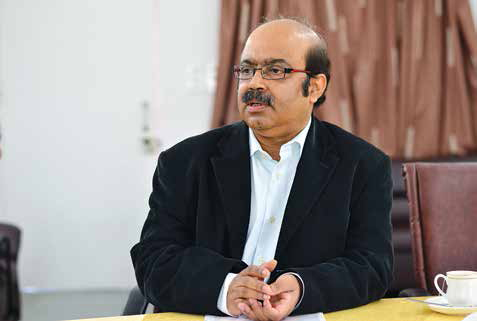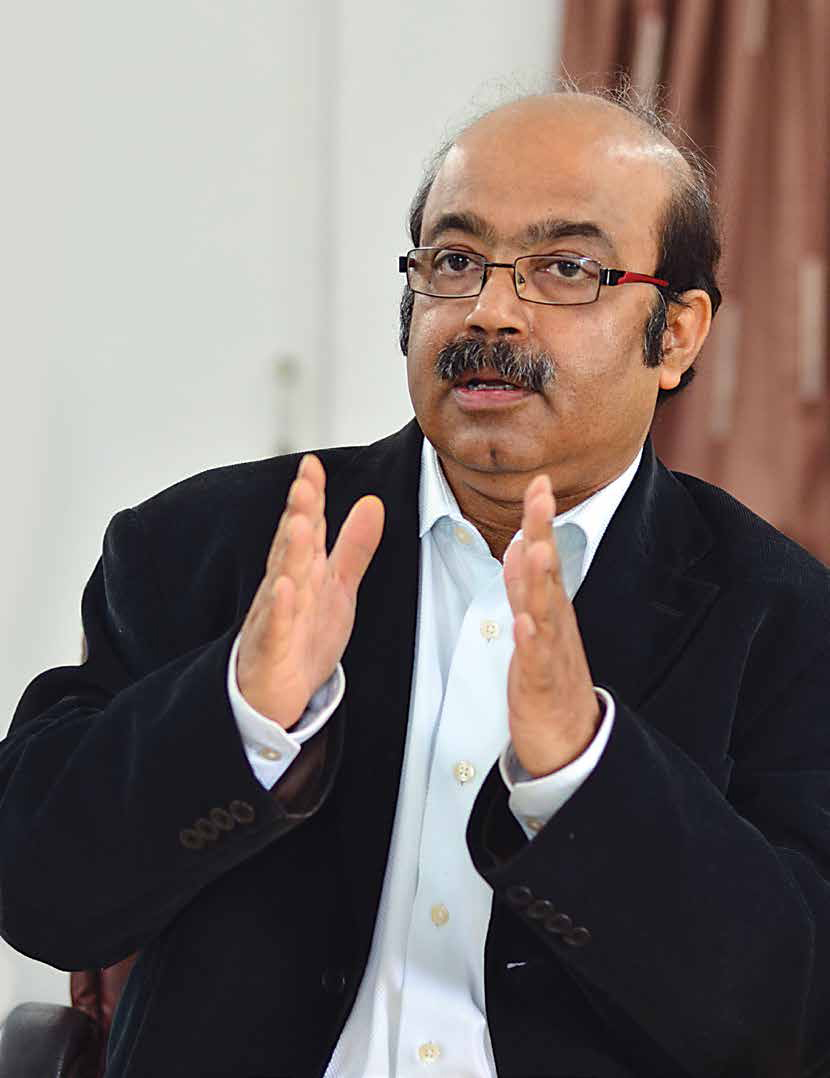Issue No.14 / September 16-30,2015

Animish Bagchi, a Chartered Accountant by profession and Senior Vice President-Finance at EagleBurgmann India Pvt Ltd, is a versatile finance professional, who is dynamic and full-of-life. With over 25 years of experience in the finance sector, he has worked with leading corporates such as Kirloskar Brothers and Birla Yamaha. In a candid conversation with Corporate Citizen, Bagchi spoke in-depth about the finance sector, finance as a profession, challenges faced, while also touching on his personal space
I would say, in the earlier days, finance as a stream was more about accounting, but today it’s all about managing. With technological development, an accountant’s job is being done by computers. But analysis, reporting, compliance with legal issues are much more important in today’s times than pure accounting. Pure accounting is not really needed these days. Since we are a multinational company with 56 subsidiaries worldwide, issues like transfer pricing has become very important. Earlier, it used to be only accounting. Today, even Chartered Accountancy as a profession has changed. The syllabus and curriculum has transformed from theoretical accounting to much more practical work. Legal issues have too gained a lot of importance
First we talk to him/her about the job requirement. We see if the person has the capability to manage the important things, for instance, say, payment of taxes. We also see his acceptability and capability of making payments in time. These days, we do not even question them on pure accounting, since we know he/ she is a graduate and will definitely know about it. We also check his knowledge on the subject of law since there are so many compliances to be met. He need not be a master of everything, but should have a working knowledge. Hence, in our company, we have a lot of MBAs rather than CAs, because managing finances and complying with the law is very important. Penalties are very high today. Under Company Law, if you default, penalties are so high that even the directors can be put behind bars.
Complying with the law is very important. Penalties are very high today. Under the Company Law, if you default, penalties are so high that even the directors can be put behind bars

I would say handling compliances, which is a very tough job. There are changes in sections of Law on a daily basis. If you’ve missed any, it’s a big problem. Company Law has become very stringent today. People are still gearing up to the changes that came about with the new Company Law that came in 2013. After three to four years, it will be easier because by then you would have understood the norms, rules and regulations.
After my graduation, I did my LLB and started practising as an advocate. However, I realised that the exploitation was higher, so I decided to become a Chartered Accountant. After doing my CA, I joined Jagatjit Industries in 1989 in Delhi. Thereafter, I joined Birla Yamaha as the General Manager, Finance and later joined Kirloskar Brothers. After spending two years there, I joined TATA Ficosa Automotive Systems Ltd. as the Chief Financial Officer (CFO). Since the last seven years, I am associated with EagleBurgmann India Pvt. Ltd. We are into the production of mechanical seals and seal supply systems, magnetic couplings, carbon floating ring seals, expansion joints and gaskets, packings, special products and extensive services. Being part of the German Freudenberg and Japanese EKK Group gives us all the resources we need for a reliable partnership built on solid foundation, worldwide. I look after the finance section, import-export, costing, and all other legal issues. This year, we gave out very good dividends. In 2007, Eagle and Burgmann merged together, worldwide. In India, it’s called EagleBurgmann India which was converted into a private limited company. So there are two main shareholders -- one Japanese and other German. We report to Japan on the administrative side and on the finance side, we report to Germany. We have a staff of about 1000 employees, where about 300 are engineers. It’s a well-managed company with no debt.
(Laughs) When my son was young, my wife left her job to be with him, till the time he completed his higher secondary school. My wife is a teacher. I still remember, we had a public issue of Birla Yamaha and my son had met with an accident and was injured but I couldn’t visit him because the prospectus had to be filed the very next day. That whole night was spent at work, checking the prospectus and finishing other pending work. My wife then took care of everything. She was with the prestigious St. Mary’s School until a few years ago, but had to quit her job for the sake of our child. Today, she has started working again.
Oh yes, I do. I like to play instruments…well I am quite bad at it (laughs), but I enjoy playing the tabla and listening to music, or playing badminton or table tennis, or even going somewhere out with my family. Today I think the pressure is much lower than what it was in my earlier days. Earlier, the targets were too high, but today because work is streamlined and smooth, the pressure is manageable. For any company, when it doesn’t grow, the entire pressure comes on the finance head. Because this company’s financials are strong and it is doing well, the pressure is much lower.
Be honest to your work, be open to learning. Keep attending informative seminars, enrich your knowledge. Try and learn what other divisions or departments are doing. It is okay for a finance professional to work in the marketing or production team for some time, mainly to understand how they function, how the product is made and so on. A finance professional need not only be confined to his role, rather he should go and spend some time in other departments as well so that he can learn more. That’s how we encourage professionals in our company as well. When you step into our industry, one thing you will realise is that you will have to change with the times. For instance, Kodak were the pioneers in making small cameras. As times changed, Nokia came in which started making mobile phones with cameras installed in it. Later, Nokia got killed by Google who came up with Android. This is because there are changes in customer behaviour and innovation is important in today’s time.
A finance professional need not be confined to his role, he should go and spend some time in other departments as well so that he can learn more’
I have travelled across the globe and have met CFOs of companies to understand how they work. In Japan, he/she need not be a Chartered Accountant to handle the finance section, even an engineer can be a CFO there. What I have seen is that Indians are very flexible and adaptable, whereas the Japanese are quite rigid in their way of working. Germans too are not very open while working with all. However, Indians who are working abroad are well groomed as they get good exposure, which in turn enhances their perspective. Professionally, things are very different outside India. So it’s not by fluke that these gentlemen are heading global giants like Google and Microsoft. They have the capability. Indians need international exposure so that we can learn more
By Mahalakshmi Hariharan